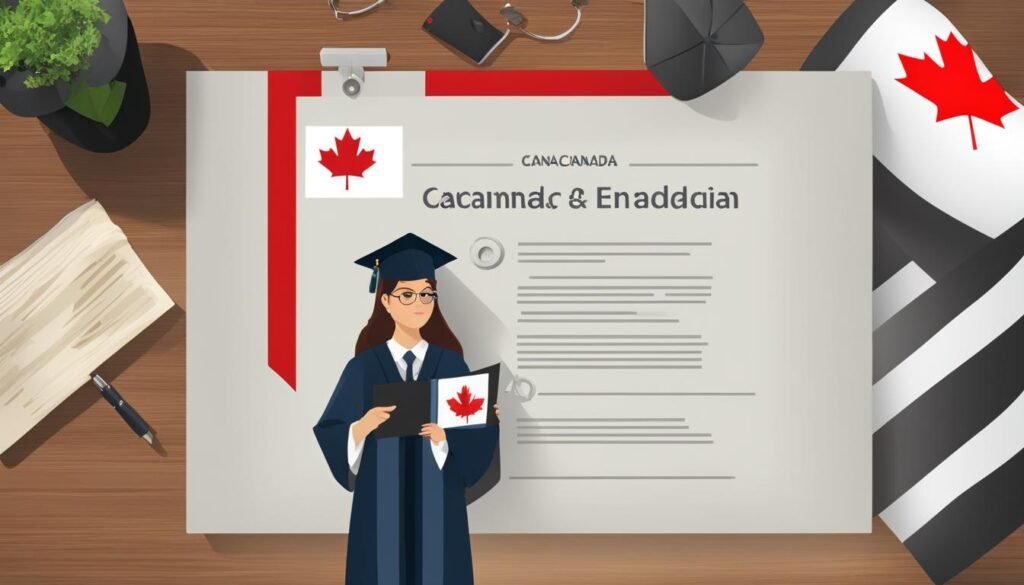Are you passionate about the environment and seeking a sustainable career that makes a positive impact? Pursuing a Master’s degree in Environmental Science could be your pathway to success. With Canada’s strong emphasis on climate change and sustainability, it offers abundant opportunities for individuals with advanced degrees in environmental science. By completing a Master’s program in this field, you can not only gain comprehensive knowledge but also open doors to various pathways for permanent immigration to Canada.
Key Takeaways:
- Obtaining a Master’s degree in Environmental Science enhances your employability and opens up diverse career opportunities in Canada.
- Canada’s commitment to climate change mitigation and sustainability makes it an ideal country for individuals passionate about environmental science.
- Completing a Master’s degree in Environmental Science shows your dedication to addressing environmental issues, making you an attractive candidate for employers in this field.
- Understanding the steps to immigrate permanently to Canada after completing your studies is crucial for building a successful career in environmental science.
- Taking advantage of the post-graduation work permit and gaining Canadian work experience can significantly increase your chances of obtaining permanent residency in Canada.
Benefits of a Master’s Degree in Environmental Science

Earning a Master’s degree in Environmental Science offers numerous benefits. It provides in-depth knowledge and skills in areas such as climate change mitigation, sustainability, and resilience planning. This specialized education enhances your employability and opens up diverse career opportunities in Canada.
A Master’s degree in Environmental Science demonstrates your commitment to addressing climate change and environmental issues, making you an attractive candidate for employers in this field.
- Advanced Knowledge: A Master’s degree equips you with advanced knowledge in environmental science, enabling you to understand complex environmental challenges and devise innovative solutions.
- Specialized Skills: Through specialized courses and research projects, you develop practical skills in areas such as data analysis, environmental modeling, and sustainable resource management.
- Career Advancement: A Master’s degree enhances your qualifications and credentials, positioning you for career growth and leadership roles in environmental science organizations.
- Networking Opportunities: Pursuing a Master’s degree allows you to connect with industry professionals, researchers, and fellow students, expanding your professional network and opening doors to potential collaborations and job opportunities.
- Research Opportunities: Many Master’s degree programs provide opportunities to engage in cutting-edge research, allowing you to contribute to the advancement of environmental science through your own research projects.
By earning a Master’s degree in Environmental Science, you gain the expertise and credibility necessary to make a significant impact in the field and contribute towards building a more sustainable future.
Steps to Immigrate Permanently to Canada

To immigrate permanently to Canada after completing a Master’s degree, you need to follow a few essential steps. These steps will guide you in obtaining the necessary permits, gaining valuable work experience, and meeting the eligibility criteria for permanent residency.
1. Obtain a Post-Graduation Work Permit
After completing your Master’s degree in Canada, one of the first steps towards permanent residency is to obtain a post-graduation work permit (PGWP). The PGWP allows you to work in Canada for a duration equal to the length of your study program, up to a maximum of three years. This work permit not only provides you with valuable Canadian work experience but also allows you to financially support yourself during your immigration journey.
2. Gain Relevant Work Experience in Canada
Gaining work experience in Canada is vital for increasing your chances of obtaining permanent residency. By working in Canada after completing your Master’s degree, you not only enhance your skills and knowledge but also demonstrate your commitment to contributing to the Canadian workforce. Consider seeking employment opportunities related to your field of study to make the most of your expertise and contribute to Canada’s environmental sector.
3. Research and Understand Eligibility Criteria for Permanent Residency
To be eligible for permanent residency in Canada, familiarize yourself with the specific criteria set by the immigration programs. Each program has its own requirements, such as language proficiency, education, work experience, and adaptability factors. Research thoroughly to understand which immigration program suits your situation best. For example, the Express Entry system uses a points-based system to assess candidates based on factors like age, education, work experience, language proficiency, and adaptability.
4. Explore Immigration Pathways: Express Entry and Provincial Nominee Programs
There are several immigration pathways available for international graduates in Canada. The Express Entry system is a popular pathway that manages applications for various federal economic immigration programs. By creating an Express Entry profile, you can be assigned a Comprehensive Ranking System (CRS) score, which determines your eligibility for permanent residency. Additionally, provincial nominee programs offered by different Canadian provinces can provide additional opportunities for international graduates to obtain permanent residency.
By following these steps and meeting the necessary requirements, you can navigate the immigration process and increase your chances of immigrating permanently to Canada. A Master’s degree in Environmental Science, combined with relevant Canadian work experience, can greatly contribute to your eligibility for permanent residency and help you build a successful career in Canada’s environmental sector.
Post-Graduation Work Permit
After completing your Master’s degree in Canada, you have the opportunity to apply for a post-graduation work permit (PGWP). This permit allows you to work in Canada for a duration that is equivalent to the length of your study program, up to a maximum of three years. The post-graduation work permit is a valuable opportunity for international graduates, as it not only provides you with hands-on Canadian work experience but also enhances your chances of obtaining permanent residency in Canada.
During your post-graduation work permit, you can gain valuable insights into the Canadian job market while developing professional skills in your field of study. The practical exposure and experience gained during this period can greatly contribute to your future career prospects, making you an attractive candidate for potential employers in Canada.
Obtaining Canadian work experience through the post-graduation work permit is highly regarded by employers in Canada. It demonstrates your ability to adapt to Canadian work culture and showcases your commitment to building a successful career in your chosen field. Moreover, the work experience acquired during this period can strengthen your application for permanent residency in Canada.
By working in Canada after completing your Master’s degree, you not only broaden your professional network but also have the opportunity to contribute to the sustainable development of the country. Canada values the contributions of international graduates in various sectors, including environmental science, and actively encourages their integration into the Canadian workforce.
During your post-graduation work permit, it is essential to actively explore employment opportunities related to your field of study and engage in networking activities. This allows you to leverage your knowledge and skills while staying updated with the latest industry trends and practices. Taking advantage of the post-graduation work permit not only provides you with a unique chance to grow professionally but also brings you closer to your goal of obtaining permanent residency in Canada.
Work Experience in Canada

Gaining work experience in Canada is crucial for international graduates who wish to immigrate permanently. It provides valuable opportunities to showcase your skills, enhance your knowledge, and contribute to the Canadian workforce. By working in Canada after completing your Master’s degree, you increase your chances of securing permanent residency and building a successful career.
Canadian immigration programs, such as the Canadian Experience Class (CEC), prioritize applicants with Canadian work experience. This highlights the importance of gaining work experience in Canada as an international graduate. By demonstrating your ability to work in a Canadian setting, you show your potential to contribute to the country’s economy and society.
When seeking employment in Canada, it is advisable to focus on opportunities related to your field of study. This allows you to apply the knowledge and skills acquired during your Master’s degree program, showcasing your expertise to potential employers. Working in a relevant field not only validates your qualifications but also positions you as a valuable asset in the Canadian job market.
Additionally, gaining work experience in Canada provides opportunities for professional growth and networking. You can establish connections with industry professionals, learn from their experiences, and expand your professional network. These connections can be instrumental in securing future job opportunities and advancing your career in Canada.
Overall, work experience in Canada is a vital step towards achieving your goal of permanent residency. It enhances your employability, validates your qualifications, and demonstrates your commitment to building a successful career in Canada. By leveraging work experience to its fullest, you position yourself as an ideal candidate for permanent residency programs and increase your chances of a bright and sustainable future in Canada.
Eligibility Criteria for Permanent Residency

To be eligible for permanent residency in Canada, you must meet specific criteria that are determined by various immigration programs. Familiarizing yourself with these criteria is essential to increase your chances of receiving an invitation to apply for permanent residency. Some key factors considered include language proficiency, education, work experience, and adaptability.
- Language Proficiency: Demonstrating proficiency in English or French is important for permanent residency. You may need to provide language test results from approved testing agencies.
- Education: Your educational background plays a significant role in your eligibility for permanent residency. Having a higher level of education, such as a Master’s degree, can enhance your chances.
- Work Experience: Having relevant work experience in Canada or overseas can contribute to your eligibility. The Canadian work experience gained through programs like the post-graduation work permit can be beneficial.
- Express Entry Points: The Express Entry system uses a points-based system to assess candidates. Factors such as age, education, work experience, language proficiency, and adaptability are considered in assigning Comprehensive Ranking System (CRS) scores.
Meeting the eligibility criteria for permanent residency increases your chances of being selected and gaining the opportunity to live and work permanently in Canada.
By fulfilling the eligibility criteria, you can take a step closer to achieving your goal of obtaining permanent residency in Canada. It is essential to carefully review the requirements of the immigration programs and seek professional guidance if needed. With determination and proper preparation, you can embark on a new chapter of your life in Canada.
Express Entry and Provincial Nominee Programs
The Express Entry system and provincial nominee programs are key pathways to secure permanent residency in Canada. These programs offer international graduates, like you, additional opportunities to achieve your dream of settling in Canada for the long term.
The Express Entry system manages applications for three federal economic immigration programs: the Federal Skilled Worker Program, the Federal Skilled Trades Program, and the Canadian Experience Class. To begin the process, you need to create an Express Entry profile and be assigned a Comprehensive Ranking System (CRS) score. This score is based on factors such as age, education, language proficiency, and work experience. Candidates with higher CRS scores are more likely to receive an invitation to apply for permanent residency.
In addition to the Express Entry system, provincial nominee programs (PNPs) offered by different Canadian provinces provide another avenue to obtain permanent residency. These programs are designed to address specific labor market and economic needs of the provinces. Each province has its own set of eligibility criteria, and if you meet those requirements, you can gain an additional Comprehensive Ranking System (CRS) score. This score can significantly improve your chances of being invited to apply for permanent residency.
Benefits of Express Entry and Provincial Nominee Programs:
- The Express Entry system provides a streamlined and efficient process for skilled workers to immigrate to Canada.
- Provincial nominee programs allow provinces to select candidates who fulfill their specific labor market needs.
- By creating an Express Entry profile, you become eligible for multiple immigration programs, increasing your chances of receiving an invitation to apply for permanent residency.
- Provincial nominee programs can provide additional points towards your CRS score, giving you a competitive edge in the Express Entry system.
- Both the Express Entry system and provincial nominee programs prioritize applicants with Canadian work experience, which you can gain through a post-graduation work permit obtained after completing your Master’s degree.
Obtaining permanent residency through the Express Entry system or provincial nominee programs is a significant step towards building your career and enjoying a fulfilling life in Canada. Whether you choose to apply through Express Entry or explore provincial nominee programs, both options provide valuable opportunities for international graduates like you to make Canada your permanent home.
Master’s Degree in Environmental Science in Canada
Canada is a renowned hub for prestigious universities and institutions that offer exceptional Master’s degree programs in Environmental Science. These programs provide a comprehensive education in crucial areas like climate change, sustainability, and environmental policy. By pursuing a Master’s degree in Environmental Science in Canada, you can acquire a strong academic foundation and practical skills that will empower you in the field of environmental science.
When choosing a program, it is essential to conduct thorough research and select an internationally accredited institution that emphasizes sustainable practices. Look for universities and institutions known for their commitment to environmental conservation and innovative research. The knowledge and expertise gained from these respected programs will help you stand out in the competitive job market and contribute to creating a sustainable future.
One advantage of pursuing a Master’s degree in Environmental Science in Canada is the flexibility offered by online programs. These programs allow you to balance your studies with other commitments, making it easier to pursue higher education and advance your career. Online programs from recognized institutions provide the same comprehensive curriculum and valuable learning opportunities as their on-campus counterparts, ensuring a high-quality education from the comfort of your own home.
Benefits of Pursuing a Master’s Degree in Environmental Science in Canada
- Access to renowned universities and institutions
- Comprehensive education in climate change, sustainability, and environmental policy
- Opportunities to gain practical skills and hands-on experience
- Connection to a network of industry professionals and experts
- Flexibility with online program options
- Internationally recognized degree
Career Opportunities in Environmental Science in Canada
Canada offers a wide range of career opportunities in the field of environmental science. As the country continues to prioritize sustainability and climate change mitigation, there is a growing demand for professionals with expertise in areas such as renewable energy, environmental policy, and conservation.
Industries such as energy, consulting, government, and non-profit organizations provide rewarding career prospects for individuals with a Master’s degree in Environmental Science. By acquiring advanced knowledge in this field, you will be well-equipped to develop innovative solutions and contribute to a more sustainable future.
With the diverse natural landscapes and abundance of natural resources in Canada, there is great potential for professionals in environmental science to make a significant impact. Whether you choose to work on renewable energy projects, engage in strategic environmental planning, or advocate for conservation initiatives, there are numerous avenues for career growth and development.
Staying updated with the latest industry trends is crucial in this rapidly evolving field. By keeping yourself informed about technological advancements, policy changes, and emerging research, you can continue to enhance your skills and stay ahead of the curve.
Networking with professionals in the environmental science community is also essential to expand your career opportunities. Attending industry events, joining professional organizations, and connecting with like-minded individuals will not only enable you to collaborate on projects but also open doors to potential job prospects and mentorship.
Conclusion
Pursuing a Master’s degree in Environmental Science in Canada can unlock a world of opportunities for a sustainable career. By following a strategic pathway to permanent residency, including obtaining a post-graduation work permit and gaining relevant work experience, you can maximize your chances of success in the field of environmental science.
Canada’s strong commitment to sustainability and addressing climate change provides a fertile ground for professionals with advanced degrees in environmental science. By immersing yourself in Canada’s environmental sector and leveraging your Master’s degree, you can actively contribute to creating a more sustainable future while fulfilling your career aspirations.
Whether you aspire to work in renewable energy, environmental policy, or conservation, Canada offers a diverse range of career opportunities. Industries such as energy, consulting, government, and non-profit organizations eagerly seek professionals with a Master’s degree in Environmental Science, making it an ideal time to embark on this academic journey in Canada.
Source Links
- https://www.thorntontomasetti.com/news/climate-action-sustainability-resilience-frameworks
- https://bnnbreaking.com/breaking-news/climate-environment/eth-zurich-unveils-groundbreaking-light-driven-method-for-carbon-capture/
- https://bnnbreaking.com/world/ireland/irelands-nitrates-action-programme-a-revolutionary-step-towards-sustainable-agriculture/


